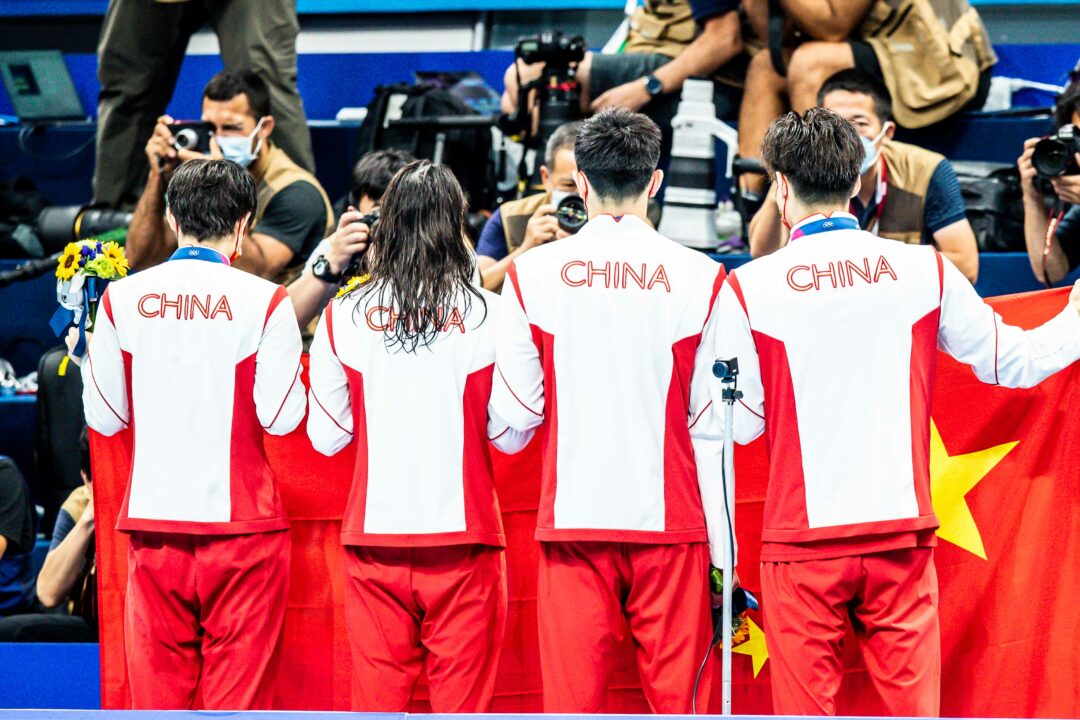The five-person committee appointed by World Aquatics to conduct an anti-doping audit review in May in the aftermath of the Chinese doping scandal has published its findings, providing an in-depth analysis of World Aquatics’ current practices and offering recommendations for the future.
The biggest takeaway from the report is the news that World Aquatics has increased the number of tests for certain targeted athletes and nations, including China.
The report notes some athletes will be tested four times by the International Testing Agency (ITA) from Jan. 1, 2024, until the opening of the Paris Olympic Games, while “a certain number of other athletes, including Chinese athletes taking part in the Paris Olympic Games, will be tested by the ITA no less than eight times during this same period.”
“The ITA will use its best efforts to have all such tests of Chinese athletes conducted by a Sample Collection Authority other than CHINADA, and to have the samples analyzed by laboratories outside of China.”
In reviewing the 2021 case, the committee ultimately found that World Aquatics (then FINA) acted in accordance with the operating procedures it had in place at the time, and followed its obligations under the World Anti-Doping Code.
FINA’S HANDLING OF CHINESE CASE
- When 23 Chinese swimmers tested positive for the banned substance trimetazidine (TMZ) in early 2021, the FINA Anti-Doping Department consisted of two staff members responsible for in-competition testing, and the global governing body had a limited partnership with the ITA for organizing out-of-competition testing and managing biological passport and sample re-analysis programs.
- The rules at the time dictated that whichever body collected a positive test—whether it be FINA or a National Anti-Doping Organization (NADO)—was responsible for handling the case and issuing a decision on a provisional suspension, and only then would the other body and the World Anti-Doping Agency (WADA) have a right to an appeal.
- After the Chinese NADO (CHINADA) informed FINA of the 23 positive tests in April 2021, they sent their final decision in mid-June. FINA retained Jordi Segura, the former director of the WADA lab in Barcelona, to investigate the case. Segura determined that food contamination was “more likely than not the source of the positive tests.”
- After review of Segura’s opinion and consulting with WADA and legal counsel, FINA determined no appeal was warranted under the circumstances.
On January 1, 2022, World Aquatics extended its partnership with the ITA, delegating essentially all anti-doping responsibilities to ensure “its anti-doping program was handled independently and expertly.”
The change resulted in four fundamental changes:
- The ITA is now solely responsible for planning and conducting drug testing for World Aquatics and for managing the
results of all such tests on behalf of World Aquatics - The ITA is now charged with sole responsibility to liaise with NADOs on their management of the results of their
own testing and all of their related decision-making. - The ITA is responsible for all intelligence and investigation responsibilities of World Aquatics under the WADA Code.
- “Here, the Committee wishes to highlight that all intelligence as it concerns the TMZ Case was passed to the ITA in 2022 and, in turn, the ITA began building a dossier on various athletes. The Committee has learned that at least one member of the ITA intelligence team attended recent World Aquatics Championships to collect intelligence on various athletes and in doing so, established useful relationships with Aquatics stakeholders in support of the ITA mandate.”
- World Aquatics has delegated the responsibility to rule on charges that the anti‐doping rules have allegedly been
violated to the Court of Arbitration for Sport Anti‐Doping Division (CAS ADD).
The committee offered 10 specific recommendations for World Aquatics to improve its anti-doping efforts, including:
- Delegating appeals decisions from NADOs to the ITA
- Time limits for NADOs on decision to provisionally suspend an athlete or not
- Ensure anti-doping cases are resolved before World Aquatics competition—or impose a provisional suspension if case still pending
- Publish provisional suspensions
- Considering conducting out-of-competition tests independent from local NADO and laboratory
- Increase opportunities for athletes to engage with ITA
- Increase anti-doping education
- Expand mandatory education course requirements
- Consider the purpose and roles of World Aquatics’ anti-doping advisory body, which now has an unclear role after ITA partnership
- Some specific changes to the WADA Code, including implementing a deadline for notifying athletes, a deadline for provisional suspensions, mandatory publication of provisional suspensions, and potentially making all anti-doping decisions public, even for those who have not committed a rule violation.
- “Publishing those decisions would increase transparency and would ensure that all decisions are subject to public scrutiny. This said, the Committee considers that it would be crucial to consult the World Aquatics Athletes Committee on this question before officially submitting the proposal of amendment to the World Anti‐Doping Code to WADA.”
The report emphasizes the need to re-establish trust in the aquatics community after the Chinese doping case.
The committee notes the increased number of tests being administered in 2024, including the targeted testing of Chinese athletes, along with the fact that the pre-Olympic tests will be published, that World Aquatics conducts more than 3,000 tests per year which is more than other international federations, and that the ITA has a dedicated team specifically collecting intelligence information to target athletes and teams.
The committee adds that World Aquatics is viewed as the main point of contact for athletes and coaches for “everything related to their sport, including anti-doping,” and must accept this challenge and increase communication with athletes.
The committee concludes:
“What is extremely clear, and what cannot be taken for granted, is that the trust of the Aquatics community is vital to the continued success of World Aquatics as an International Federation. The suggestions set out herein are aimed to provide a roadmap for World Aquatics to ensure that trust is strengthened both now and into the future.”


There come discrepancies btw. database of entities: AI and USADA while these two are supposed to do their statistics respectively.
https://aquaticsintegrity.com/statistics/
https://www.usada.org/news/athlete-test-history/
AI lists Dressel was tested 7 times during 2023, “the figure includes any successful test attempt in 2023. Therefore, including both out of competition testing and in competition testing, plus testing conducted by other anti-doping organisations (ADO).”
USADA posts 2 samples were collected from Dressel by USADA during 2023.
“The number of samples USADA has collected is typically not the number of test sessions an individual athlete has been selected for during a given period, as multiple samples (e.g., blood, urine, Dried Blood Spot) are often collected… Read more »
2 comments
1. This close to the Olympics is too late.
2. Did anyone ask HOW the drug got in the food? It doesn’t just happen. Was is put in the food on purpose to enhance the athletes? Was it sabotage? Was it a cover up? It certainly seems almost impossible this drug is in a kitchen accidentally.
While what we truly want is for them to be completely clean, this intervention will actually make a difference. The Chinese athletes who had free reign to dope previously will not have that opportunity now and we will see at least some dropoff in their performances. We won’t see the same dropoffs in the clean athletes.
Doping in the leadup to and during major competitions creates significant benefits that they won’t have. (Think back to the World Championships in Perth in the late 1990’s when the suitcase was full of vials of HGH that they brought to the competition).
This doesn’t mean a whole lot now, steroids and other PEDs can still provide benefits after traces of those substances have left the body. There’s growing evidence that PEDs can provide benefits for your entire life after use.
Some sources to check out
https://www.bbc.com/news/science-environment-24730151.amp
https://www.pbs.org/wgbh/nova/article/effects-performance-enhancing-drugs-may-last-decades/
It shouldn’t be a surprise that doping 1-3 years ago will give unfair advantages today.
Also, everyone on Weibo called Gretchen Walsh, Regan Smith, Dressel etc a drug cheat during trials. Especially Gretchen, 100s of comments worse than anything on SwimSwam
Doesn’t change anything the damage is done but if china wins anything we know who the real winners are. similar to the mens 800m with the Algerian lol
Yup, on LetsRun everyone is skeptical of not just him but a bunch of 800 runners suddenly going 142.
Gretchen Walsh 0 test last year?? Seriously?
Don’t you have to be in the top 10 LCM to be tested out of competition? Bathtub swimmers aren’t included 🙂
She won Gold in the Women’s medley relay so she should have been tested for that at least
USADA tested her 9 times last year, but it’s very strange that she doesn’t show up in the AIU database. Aren’t all medalists tested at Worlds?
double standard